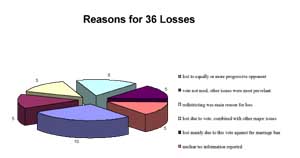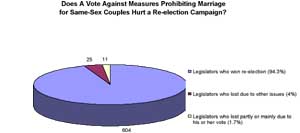-
- Split in Martin Luther King’s family reflects same-sex marriage debate
- Report: Number of gay linguists discharged higher than thought
- Domestic partner amendment used in defense against domestic violence charges
- Renewing AIDS activism
- Supreme Court sidesteps gay adoption case
- Proposed Iowa ordinance protecting gays faces opposition
- National News Briefs
- World News Briefs
san diego
Report shows support for GLBT rights didn’t hurt politicians during election
Ninety-four percent re-election rate for candidates who opposed same-sex marriage bans
Published Thursday, 20-Jan-2005 in issue 891
An analysis of the impact marriage-related votes had on state legislative races found that only 1.7 percent of incumbents lost their bid for re-election because they voted against constitutional amendments banning same-sex marriage. The Jan. 19 report, run by the Human Rights Campaign (HRC) and the Equality Federation, investigated whether voting against measures to prohibit same-sex marriage cost legislators to lose their seats.
Legislators in 28 states had to vote on bills, resolutions and amendment proposals in the 2004 legislative session pertaining to the issue of marriage equality, the report said, and legislators in 22 of those states sought re-election in November. Of the 881 legislators who voted against legislation to limit rights for same-sex couples in these 22 states, 640 were up for re-election and 604 won.
None of the nation’s openly gay and lesbian state legislators lost their bid for re-election.
“I think what’s fair to say is, across the board, there weren’t any particular factors that made legislators more likely to lose,” HRC Communications Coordinator Michael Cole told the Gay & Lesbian Times. “… There’s nothing to suggest that a particular factor led more to legislators being penalized for these votes.”
The findings were released a week after 22 national GLBT rights organizations, including HRC, Lambda Legal, Gay & Lesbian Alliance Against Defamation, the National Gay and Lesbian Task Force, Log Cabin Republicans, Stonewall Democrats and the National Black Justice Coalition, released a joint statement saying they are not backing down from marriage equality despite its use as a wedge issue last election season. “We must continue to expose the radical right’s efforts to advance a culture of prejudice and intolerance, and we must fight their attempts to enshrine anti-gay bigotry in our state and federal laws and constitutions,” the statement read.
The HRC and Equality Federation report “is a useful tool for us in partnership with statewide groups to say, ‘You might be cautious about this vote, but know that this has happened before and the threats that people on the right make just don’t pan out,’” Cole said.
In compiling the report, HRC and Equality Federation gathered data on all legislators up for re-election who had voted against legislation banning same-sex marriage, calculated their success rate, and interviewed them after the election. The groups also interviewed political experts and statewide GLBT organizations in each state, and factored in state-specific data in which redistricting and multi-candidate races played a role.
There was no correlation between the outcome of the presidential race in a state and the re-election rate of the state legislators who voted against banning marriage for same-sex couples. The data showed a 93-percent re-election rate for legislators in red states who voted against banning same-sex marriage and a 95-percent re-election rate in blue states.
One hundred and forty Republicans bucked their party and voted against banning same-sex marriage last year, and of those, 82 ran for re-election, prompting speculation that their votes would damage their re-election prospects, the report said.
It found, however, that of those 82, 78 won the primary election and 67 won the general election. Ohio Republican Rep. Nancy Hollister is the only candidate who attributed her loss in part to her vote against same-sex marriage bans.
“It was slightly less [re-election percentage] for Republicans, but with a lot of them, it wasn’t really the marriage issue – they were redistricted, or there were multi-candidate races in New Hampshire, for example, so there’s other factors that played in,” Cole said.
Of the 36 incumbents, both Democrats and Republicans, who lost their bid for re-election, 10 lost their race to candidates who also opposed banning same-sex marriage.
Five of the 36 attributed their loss directly to their vote against limiting the rights of same-sex couples in 2004 and six cited their vote as one of a number of factors that contributed to their loss.
Cole said attributing a candidate’s loss to their vote on same-sex marriage legislation was determined by interviewing local experts and GLBT organizations in addition to the legislators themselves. Analyzing the complex factors that went into individual races helped rule out possible sour-grapes responses to losing the election.
“Just as prevalent were cases in which incumbent state legislators lost their seats at least in part due to their vote for constitutional amendments and other marriage restrictions, particularly in Democratic primaries,” the report also noted.
Eleven states had constitutional amendments banning same-sex marriage on their ballots in November. President Bush’s call in February for an amendment to ban same-sex marriage after the Massachusetts Supreme Court ruled in November 2003 that it was unconstitutional to prohibit same-sex couples from marrying was widely seen as an effort to rally his conservative base for re-election and win over socially-conservative swing voters.
HRC and the Equality Federation concluded there was no correlation between voters who approved same-sex marriage legislation and legislators who lost because they voted against legislation prohibiting same-sex marriage. For example, 91 percent of legislators in Missouri who voted against same-sex marriage bans were re-elected, and voters also elected the state’s first openly lesbian legislator, though they had approved a constitutional amendment banning same-sex marriage three months prior to the general election.
“The amendments that were on the ballot were really in the infancy of this conversation with people, and it is a complex issue,” Cole explained. “What it comes down to is that voters were given the final exam on the first day of class.”
In Georgia, Kentucky, Oklahoma and Utah, the same voters who approved constitutional amendments banning same-sex marriage also re-elected a combined total of 97 percent of representatives who voted against putting the amendments on the ballot in the first place.
“The untold story – yes, there were 13 amendments that passed – but last legislative cycle, there were 15 other amendments that were not voted out of the legislatures,” Cole noted. “So what we see is that when the legislative process – which is designed to have feedback and different points of view, and very deliberative conversations – when that deliberation happens, legislators come down on the side of fairness.”
All legislators in California, Indiana, Iowa, Kentucky, Massachusetts, Oklahoma, South Carolina, South Dakota and Tennessee who voted against limiting marriage rights won re-election, though seven of these were red states. In Arizona, Idaho, Michigan, Minnesota, Ohio, Utah, Wisconsin and Wyoming only one legislator in each state who voted against limiting marriage rights and ran for re-election lost.
In Maine, nine legislators who voted against legislation to ban same-sex marriage lost their races, eight in Kansas, seven in New Hampshire and two in Georgia and Missouri. Factors such as redistricting and multi-candidate races came into play in many of the states with larger losses, Cole said.
In California, many politicians who publicly supported same-sex marriage ran successful races, including Lori Saldaña, who replaced Kehoe in the 76th Assembly District and has already signed on in support of AB 19, the Religious Freedom and Civil Marriage Protection Act seeking to legalize same-sex marriage in California.
GLBT-friendly state legislation was largely successful in California’s last legislative session, with bills addressing hate crimes laws, employment and housing non-discrimination and insurance equality passing the governor’s desk.
Nationally, the report found that the high re-election rate was also inconsistent with supposition that representatives from rural or suburban districts would be more likely to lose due to votes against banning same-sex marriage because of socially conservative majorities, and inconsistent with geographic regions. “Unexpectedly, the highest re-election rates were in the South, where 98 percent of the legislators voting against marriage bans won re-election,” the report stated. Ninety-three percent of these legislators were successful in the Midwest, 94 percent in the Northeast and 96 percent in the West.
|
|
Copyright © 2003-2025 Uptown Publications



